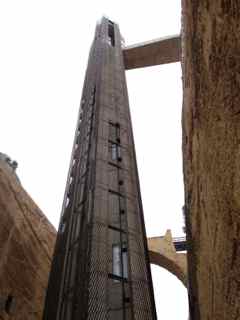 Sailing into the dock for Valetta, Malta makes me feel as though I’m a character in a Game of Thrones novel. The heavily fortified walls of the multiple isthmuses that surround the main harbor are lined with tall ramparts of aged limestone and truly suggest one of the most intriguing places I’ve ever been. It looks like a place that Brianne of Tarth should visit.
Sailing into the dock for Valetta, Malta makes me feel as though I’m a character in a Game of Thrones novel. The heavily fortified walls of the multiple isthmuses that surround the main harbor are lined with tall ramparts of aged limestone and truly suggest one of the most intriguing places I’ve ever been. It looks like a place that Brianne of Tarth should visit.
For some reason, I’ve never paid much attention to the country of Malta and barely knew where to place it on a map of the Mediterranean. Now that I’ve been here and know a bit of its history, it seems remarkable that its inhabitants don’t fume about the way centuries of invaders have fought over it. Everyone seems to have invaded at one time or another—the Arabs, the Italians, the French, the Spanish, the British. (Its first residents built Stonehenge-like stone megaliths that date back 6000 years—that’s before the Pyramids, folks!)
Today, the area’s distinctive look is largely the legacy of the last major victors over the island—the Knights of St. John who arrived in 1530 and then decisively defeated the Ottomans at a battle in 1565, ensuring Western Europe stayed Christian. Various Catholic monarchs rewarded the Knights’ success with enormous funds, which allowed the order to build the huge fortresses that still dominate the city landscape.
Of course, the sixteenth century wasn’t the last time war focused on the island. During WWII, it was a major front between the Allies and the Axis, and the island suffered more bomb attacks than London. But there’s little visible evidence remaining of that devastation. The bombed-out historic sites were carefully rebuilt and restored; since the local limestone quickly ages to the same uniform color, everything now looks like it’s been there for five hundred years. (At one point driving from the town of Vittoriosa to the capital of Valetta, I was astonished to see that one of the “historic” buildings I was admiring displayed a capstone over its entry announcing it was built in 1998!)
These towns were designed as fortified cities that could be easily defended. The streets are narrow; there is little vegetation; and the ramparts offer fantastic views. Since the monastic Knights from each country acted a bit like some wealthy fraternities living in their own respective houses, it has also resulted in a lot of interesting historic architecture. Unfortunately for us, it started raining heavily during our visit and we were whipped by a cold wind. So we chose to cut short our walking tour, descend in a tall modern elevator to the wharf where the MS Rotterdam was docked, and enjoy a hot lunch while we contemplated the need to return to Malta someday soon.
Robert adds: What a fantastic place this is! We frequently say, on these cruises, that we just get a taste of some of the ports, and think that someday we might revisit them more in depth. This island nation is definitely someplace we would like to return to. Here are some random interesting tidbits:
We started our tour in a town called Marsa, which we learned means “port” (in Arabic I think, but don’t quote me on that). It is the same root word – Marsa/port – that gives us Marseille in France and Marsala in Italy. I found that fascinating.
The Maltese language is a polyglot, with many borrowings from Italian, Spanish, French, and English (coinciding with the various occupations over the centuries), but the roots are Arabic. However, their written language uses the Roman alphabet and not Arabic script. Nice blending of cultures there, I think.
Speaking of which, the predominant religion in Malta is Roman Catholic, but our guide explained that again they use a mixture of words. The Virgin Mary is referred to interchangeably as Blessed Virgin, Madonna (Spanish), or Sultana (Arabic). But here’s where it gets really interesting: even though they are Catholics, for “God” they use the word “Allah.” No one fusses or fumes over it. One God, different names. Now wouldn’t it be great if this kind of peaceful coexistence and multiculturalism were the norm?
To check out Dennis’s novels, visit www.amazon.com/author/dennisfrahmann